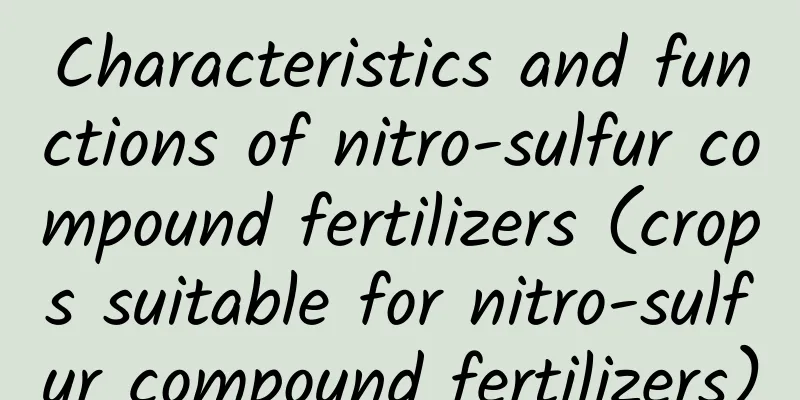Characteristics and functions of nitro-sulfur compound fertilizers (crops suitable for nitro-sulfur compound fertilizers)

|
Nitrate-sulfur based compound fertilizer refers to a compound fertilizer in which the nitrogen element is provided by ammonium nitrate and the potassium source is potassium sulfate, or potassium chloride is removed by removing the chloride ions. This type of compound fertilizer does not contain biuret and the chloride ion content is less than 3%. So what are the characteristics of nitrosulfur-based compound fertilizers? What role can it play? Characteristics of nitrosulfur-based compound fertilizer1. Fast and efficient Nitrate-sulfur based compound fertilizer is rich in nitrate nitrogen. After application, the nitrogen nutrients dissolve quickly and can be directly absorbed by crops. The fertilizer effect is fast and obvious , and the fertilizer utilization efficiency is high. 2. Completely water soluble Nitrate-sulfur based compound fertilizer dissolves quickly without leaving residue, and the nutrients in it are released more evenly , effectively improving fertilizer utilization. 3. Pure potassium sulfate The application of nitro-sulfur based compound fertilizer on sulfur-loving crops such as beans, onions, garlic, grapes, and tomatoes can significantly increase the content of protein, vitamin C, etc., and improve the quality and flavor of agricultural products. This type of fertilizer is particularly suitable for chlorine-averse economic crops such as tobacco. It is a fertilizer for sulfur-loving crops, chlorine-averse crops, and saline-alkali soils . 4. Promote root growth and fruit growth Nitrate-sulfur based compound fertilizer can coordinate soil nutrient supply , improve crop growth environment, increase root vitality, promote root development, and enhance plant resistance to drought and disease. Advantages of nitrosulfur based compound fertilizer 1. Dryland crops Nitrate-sulfur based compound fertilizer is suitable for dryland crops, especially for crops that prefer sulfur and dislike chlorine or for sulfur-deficient or saline-alkali soils, and will not cause residual pollution . 2. Meet the needs of different crops at different stages Used as base fertilizer or topdressing, it can meet the different nutrient demands of crops at different growth stages and improve their disease resistance and lodging resistance . 3. Rapid fertilizer effect Compared with other traditional compound fertilizers, nitro-sulfur based compound fertilizers contain higher nitrogen and potassium, have a reasonable formula, strong solubility, rapid fertilizer effect, and are beneficial to the absorption of nutrients such as phosphorus and potassium by crops. Therefore, it has a high fertilizer utilization rate, avoids or reduces the accumulation of nitrite in plants, and is a new type of compound fertilizer that is high-quality, efficient, green, environmentally friendly and pollution-free. 4. Long-lasting fertilizer effect The nitro-sulfur based compound fertilizer has an effective period of about 90 days. It is a new type of compound fertilizer that is high-quality, efficient, green, environmentally friendly and pollution-free. What crops are suitable for nitrosulfur compound fertilizers? 1. Cash crops Nitro-sulfur compound fertilizers are usually suitable for crops with high economic value, such as fruits and vegetables . They are especially suitable for crops that prefer sulfur but avoid chlorine or for sulfur-deficient, saline-alkaline soils. Using nitro-sulfur compound fertilizers as topdressing has a fast release effect and is beneficial to the growth and expansion of fruits and vegetables. At the same time, the sulfur element in it is also beneficial to improve the quality of these crops. 2. Food crops Nitrate-sulfur based compound fertilizer is more expensive than potassium chloride and is generally not used on food crops. It is mainly used on cash crops such as vegetables and fruit trees , and has good economic benefits. 3. Sulfur-loving crops Both nitrate-sulfur-based fertilizers and potassium sulfate fertilizers can provide potassium fertilizers for crops, and have a significant yield-increasing effect on sulfur-loving crops such as tobacco, tea trees, fruit trees, potatoes, beets, cruciferous vegetables, onions and garlic. 4. Chlorine-free crops Nitrate-sulfur based compound fertilizers can be applied to chlorine-sensitive crops such as tea, grapes, peaches, apples, tobacco, potatoes, sweet potatoes, beets, citrus, sugarcane, watermelon, lettuce, amaranth, cabbage, peppers, eggplants and tomatoes to significantly improve quality and promote growth and development. |
Recommend
How to deal with the yellowing of green radish
1. Shading The green ivy does not like too strong...
What flowers are suitable for growing in Meizhou? What are the city flowers and trees?
1. Climate characteristics of Meizhou Meizhou has...
How often should I water the Boston fern?
How often should I water the Boston fern? When wa...
How to propagate Strelitzia
Sowing time Late March every year is the best sea...
How to prune ground-planted roses in winter?
With its abundant flowers, long flowering period ...
Key points for apple tree management in July
July is a critical growing period for apple trees...
What to do if the Clerodendrum thomsoniae does not bloom
1. How long is the flowering period? If it is gro...
Can the lucky bamboo leaves turn green again after turning yellow?
1. Can it still be green? Whether the leaves of l...
Simple cutting propagation method of asparagus fern
Timing of cuttings of asparagus fern Cuttings can...
Where is Dendrobium officinale suitable for planting?
Dendrobium officinale planting area Dendrobium of...
Can red maple trees be transplanted in winter? Which month has the highest survival rate?
Can red maple trees be transplanted in winter? Re...
How to fertilize lotus? Can lotus grow without fertilizer?
1. Fertilization method 1. Seasonal influence: Lo...
The latest high-yield cultivation technology of lettuce
Lettuce, also known as celery, is widely grown in...
Is it okay to use tea water to wash vegetables and water the beautiful leaf banana?
Watering the Beautiful Leaf Banana with Tea Some ...
How to grow white wax bonsai
1. Soil Preparation It is tolerant to barrenness ...









